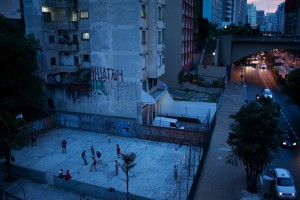I wanted to share this short video clip I came across in the New York Times. While we have been talking a lot about the astronomical political and economic effects of the 2014 World Cup on Brazil, I think this video highlights a more personalized perspective on the passion Brazilians have towards the sport. Soccer is a tradition that has been passed down from generation to generation in this community. Why pour billions of dollars into a stadium when you can dig one out of the ground?
This video was the precursor to an article about pickup soccer, or pelada, and it’s popularity in Brazil. This anecdotal reflection on the importance of the game is definitely worth a read.

The juxtaposition of the modernized streets with the spontaneous game of pelada embodies the beauty of the street game.
Organized soccer clearly has it’s value as it draws fans from all over the world who glorify professional players and teams through a national identity. There is something magnificent about a stadium filled with eager fans chanting and jeering. But I believe one finds true beauty in the sport by recognizing it as a street game. The pure essence of soccer comes not from fancy uniforms, screaming coaches, or shiny trophies, but from the innate ability to play. Pelada’s prominent existence in Brazilian culture reflects this notion that at it’s core, soccer is a simple game. It is an integral part of Brazilian culture which often serves as an escape for all of it’s citizens: children, day workers, busboys, and waiters alike. The ball reflects the passions and dreams of the average Brazilian, who uses soccer as an escape from crime, societal problems, and everyday hardships. It gives hopes to young people that one day, they may rise to the ranks of their favorite soccer stars. The power of soccer transcends socio-economic status and fame. Pelada plays just as integral a part in soccer culture as the national Brazilian team does.

Joga bonito indeed! Its small wonder that Brazil produces so many great players. If children are willing to carve a pitch just to play, their dedication to the game can hardly be questioned.
It reminds me of a story I read about Pele. As children, players in his favela could not afford a read ball, so they would stuff socks with newspaper and use the improvised ball to play.
When theres a will, there is a way
June, I’m glad you posted this video. I, too, saw it and thought it was fascinating, especially given some of the readings we’ve studied recently. This video, as well as the accompanying article, shows how soccer is such a democratic game, one that can be played anywhere and seemingly, with anything. Hopefully this side of the game receives more attention at the 2014 World Cup. I highly encourage everyone to watch this video and read the article.